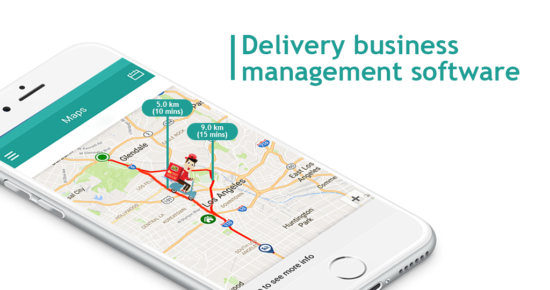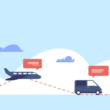In the dynamic landscape of small business operations, efficient delivery management is crucial for success. As the demand for seamless and timely deliveries grows, small businesses are turning to delivery software solutions to optimize their logistics. This article explores the essence of delivery software for small businesses, elucidates the benefits of its adoption, and delves into the top five successful delivery software solutions tailored for small-scale operations.
What Is Delivery Software For Small Business?
Delivery software tailored for small businesses serves as a comprehensive digital solution strategically designed to address the intricate logistics and operational challenges associated with the delivery of goods and services. It encapsulates a suite of specialized tools and features that empower small enterprises to manage their delivery processes with precision and efficiency. Unlike generic logistics solutions that might overwhelm smaller operations, this software is intricately crafted to align with the unique needs and scale of small businesses.
At its core, delivery software for small businesses provides a centralized platform where businesses can orchestrate their entire delivery ecosystem. This includes order processing, route optimization, real-time tracking, and communication with both customers and delivery personnel. The software acts as a digital conduit, seamlessly connecting various elements of the delivery chain to ensure a synchronized and streamlined process. With a user-friendly interface and tailored functionalities, delivery software for small businesses facilitates a level of operational sophistication that might otherwise be challenging to achieve, allowing these enterprises to compete effectively in the modern market.
Benefits Of Using Delivery Software For Small Business
Delivery software can be an effective tool for small businesses to save time and money, reduce errors, improve customer service, make better business decisions, and improve employee efficiency. Here are the top five benefits of using delivery software for your small business:
1. Streamlined Operations
Delivery software plays a pivotal role in streamlining the day-to-day operations of small businesses by providing a centralized hub for order management, route optimization, and real-time tracking. This results in a more organized workflow, reducing the likelihood of errors and delays. From order placement to final destination, the software ensures that each stage of the delivery process is executed with efficiency and precision.
2. Enhanced Customer Experience
In the era of heightened customer expectations, delivery software contributes significantly to enhancing the overall customer experience. By offering accurate delivery estimates, real-time tracking, and proactive communication, small businesses can foster customer satisfaction and loyalty. Customers appreciate transparency in the delivery process, and delivery software ensures that businesses can meet these expectations consistently.
3. Cost Savings
Optimizing delivery routes and improving operational efficiency are key components of cost savings facilitated by delivery software. Small businesses can minimize fuel costs, reduce vehicle wear and tear, and enhance resource utilization. This not only contributes to financial savings but also positions the business for sustainable growth by optimizing its use of resources.
4. Data-Driven Decision-Making
The data generated by delivery software provides valuable insights that empower small businesses to make informed decisions. Analyzing delivery performance, customer preferences, and operational bottlenecks allows businesses to refine their strategies. From optimizing routes to understanding peak delivery times, the data-driven approach facilitated by the software is instrumental in fine-tuning operations for optimal results.
5. Scalability
One of the critical benefits of using delivery software for small businesses is scalability. As these enterprises grow, the software can seamlessly accommodate increased order volumes, additional delivery routes, and evolving operational requirements. This ensures that the software remains a strategic asset, capable of adapting to the changing needs of the business.
The Top 5 Delivery Software For Small Business
1. Onfleet
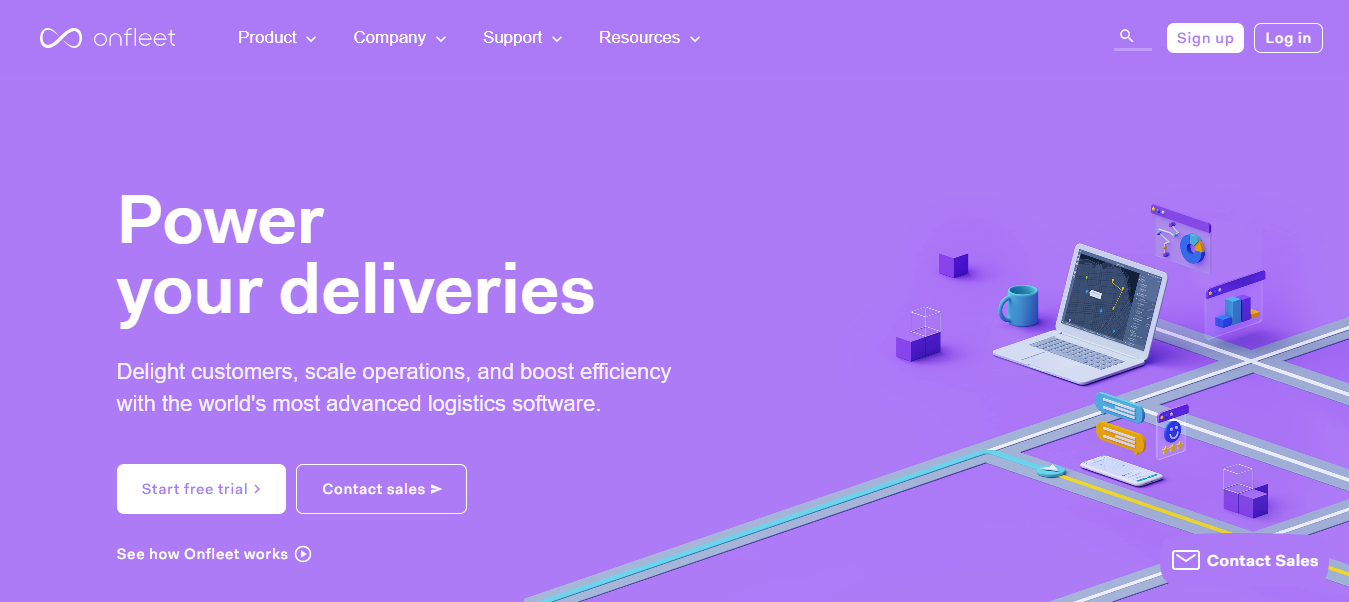
Onfleet stands out as a versatile and user-friendly delivery management platform tailored for small businesses. Its detailed overview encompasses a robust set of features designed to streamline the last-mile delivery process. The platform excels in providing real-time tracking, efficient route optimization, and comprehensive analytics tools.
Onfleet’s user-friendly interface ensures accessibility for users with varying levels of technical expertise, making it an ideal choice for small businesses. Real-time tracking allows businesses and customers to monitor the delivery progress accurately, enhancing transparency and customer satisfaction. The platform’s route optimization feature contributes to cost savings by reducing travel time and fuel costs. Additionally, Onfleet’s analytics tools empower businesses to analyze delivery performance, identify trends, and make data-driven decisions for continuous improvement.
While Onfleet offers adaptability and real-time tracking features, businesses should be mindful of their specific needs and budget constraints when considering this platform.
Price: Onfleet’s pricing model is tailored to the specific needs of each business, offering flexibility. Small businesses can request a quote based on their operational requirements.
Notable Features
- Real-Time Tracking: Onfleet offers robust real-time tracking, allowing businesses and customers to monitor the delivery progress accurately.
- Route Optimization: The platform optimizes delivery routes, reducing travel time and fuel costs.
- Analytics: Onfleet provides analytics tools for businesses to analyze delivery performance and make data-driven decisions.
Summary
Onfleet’s adaptability, real-time tracking features, and analytics tools make it a valuable asset for small businesses looking to enhance their delivery operations. However, businesses should be mindful of their specific needs and budget constraints when considering Onfleet.
Watch Out For: While Onfleet is known for its user-friendly interface, businesses should ensure that the platform aligns with their specific operational requirements.
2. Bringg
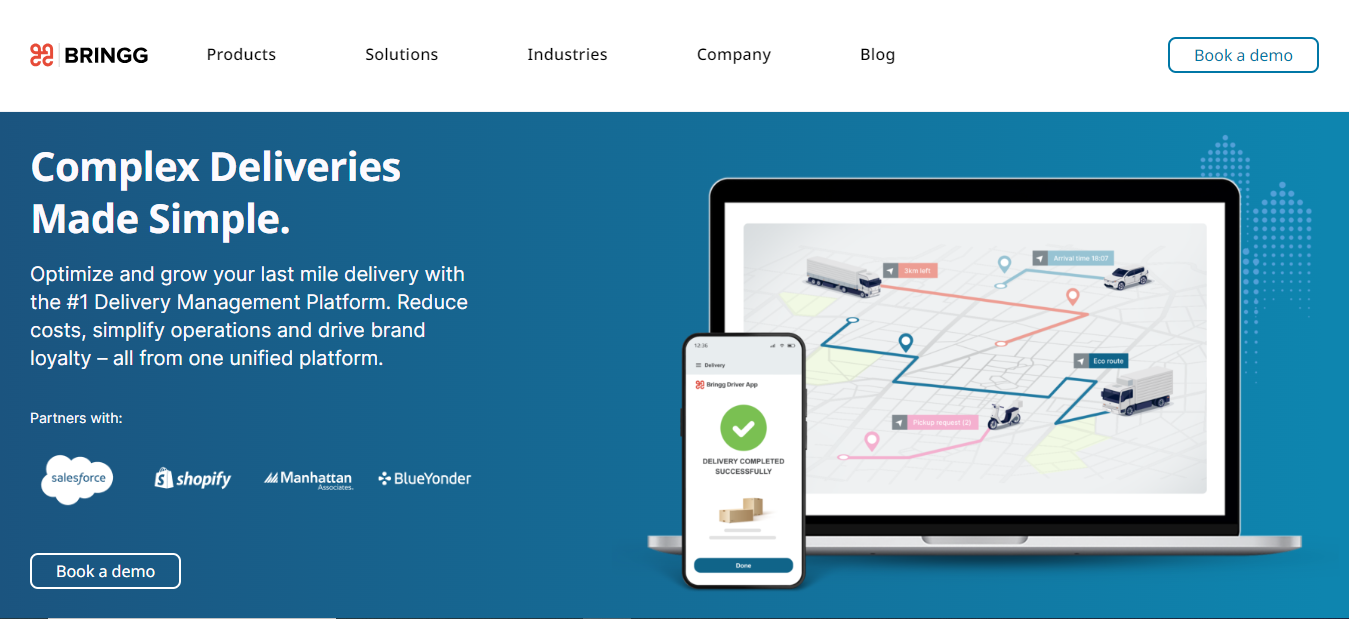
Bringg emerges as a comprehensive delivery orchestration platform specifically designed to meet the unique needs of small businesses. Its detailed overview encompasses features that provide real-time visibility, route optimization, and robust customer communication tools.
Bringg’s flexibility and scalability make it an ideal solution for small businesses seeking to enhance their delivery capabilities. The platform excels in providing real-time visibility into the entire delivery process, offering insights from order placement to completion. The route optimization feature ensures efficient and cost-effective delivery routes. Moreover, Bringg’s customer communication tools contribute to an enhanced customer experience by keeping customers informed throughout the delivery journey.
While Bringg emphasizes real-time visibility, route optimization, and customer communication, businesses should carefully evaluate their specific needs and budget constraints when considering this platform.
Price: Bringg provides customized pricing based on the business’s specific requirements. Small businesses can request a quote to align the solution with their budget constraints.
Notable Features
- Real-Time Visibility: Bringg offers real-time visibility into the entire delivery process, from order placement to completion.
- Route Optimization: The platform optimizes delivery routes, contributing to cost savings and improved efficiency.
- Customer Communication: Bringg includes tools for proactive customer communication, enhancing the overall customer experience.
Summary
Bringg’s emphasis on real-time visibility, route optimization, and customer communication positions it as a valuable asset for small businesses. Its adaptability and scalability ensure that businesses can grow with the platform.
Watch Out For: Small businesses should carefully evaluate their specific needs and ensure that Bringg aligns with their operational requirements and budget constraints.
3. ShipBob
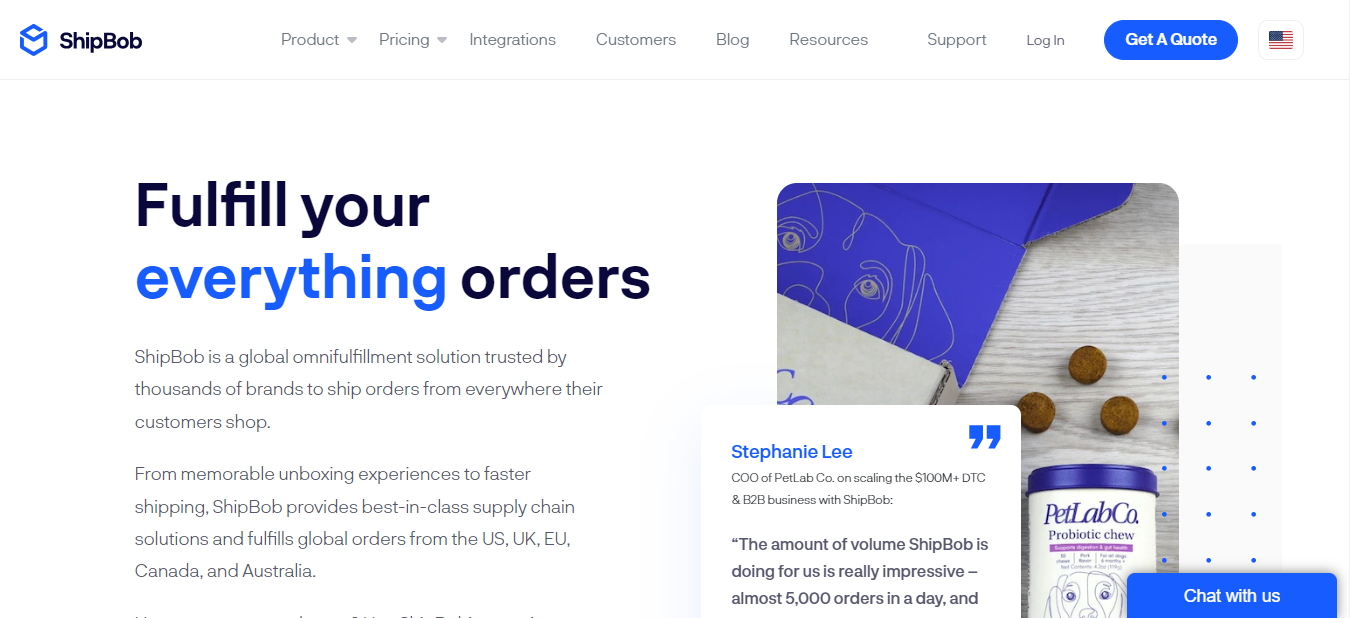
ShipBob stands as an e-commerce fulfillment and delivery software designed to cater to the needs of small businesses. Its detailed overview encompasses a comprehensive set of features that streamline inventory management, order fulfillment, and shipping processes.
ShipBob excels in providing robust inventory management tools, allowing small businesses to track and manage their stock efficiently. The platform’s order fulfillment process, from packing to shipping, is designed to ensure timely deliveries, enhancing customer satisfaction. ShipBob’s integration capabilities with popular e-commerce platforms contribute to overall operational efficiency for businesses engaged in online retail.
While ShipBob focuses on e-commerce fulfillment, small businesses should assess whether this aligns with their specific industry focus.
Price: ShipBob’s pricing varies based on the business’s needs and order volume. Small businesses can obtain a quote to align the solution with their budgetary constraints.
Notable Features
- Inventory Management: ShipBob offers robust inventory management tools, allowing small businesses to track and manage their stock efficiently.
- Order Fulfillment: The platform streamlines the order fulfillment process, from packing to shipping, ensuring timely deliveries.
- E-commerce Integration: ShipBob integrates seamlessly with popular e-commerce platforms, enhancing overall operational efficiency.
Summary
ShipBob’s focus on e-commerce fulfillment, coupled with its robust inventory management and order fulfillment features, makes it a valuable solution for small businesses in the e-commerce space.
Watch Out For: Small businesses should assess whether ShipBob aligns with their specific industry focus, particularly if they are engaged in e-commerce.
4. Tookan
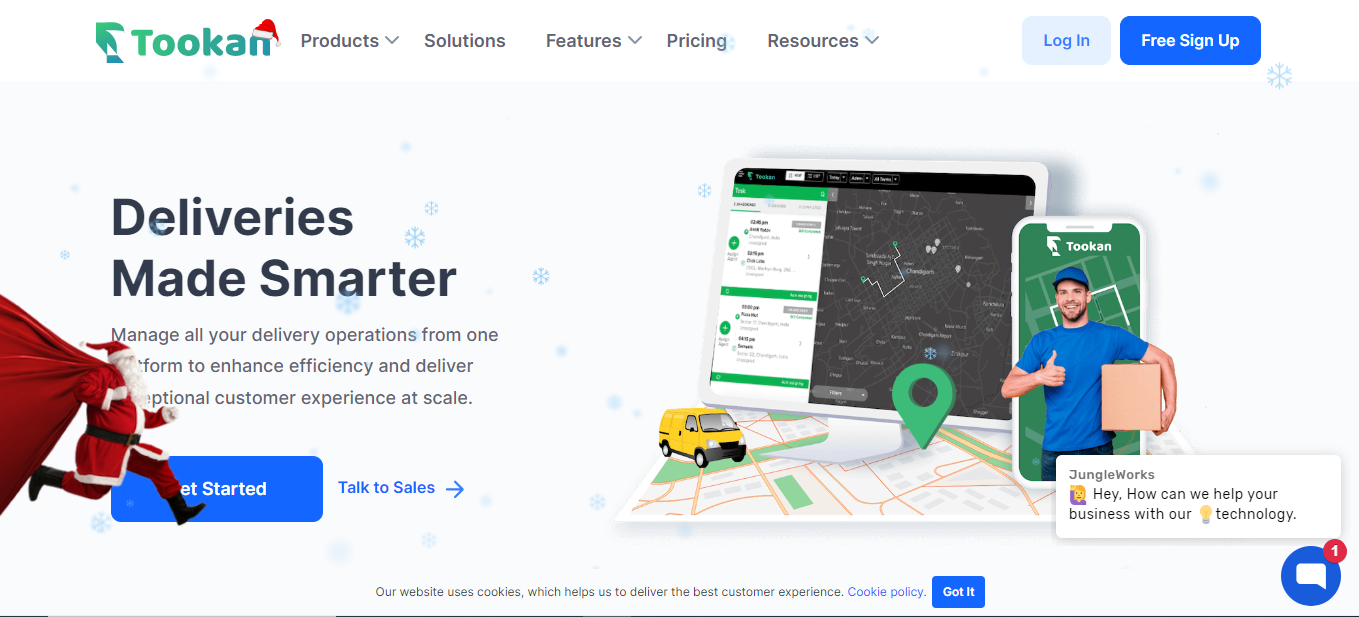
Tookan positions itself as a delivery management software catering to the unique needs of small businesses. Its detailed overview encompasses features such as efficient route planning, real-time tracking, and task allocation.
Tookan’s user-friendly interface ensures accessibility for businesses with diverse teams. The platform’s route planning feature facilitates efficient delivery routes, optimizing for time and cost efficiency. Real-time tracking allows businesses and customers to monitor the delivery progress accurately, enhancing transparency. Additionally, Tookan’s task allocation tools ensure that resources are optimally utilized throughout the delivery process.
While Tookan emphasizes route planning, real-time tracking, and task allocation, businesses should evaluate its feature set to ensure it aligns with their specific operational needs and objectives.
Price: Tookan’s pricing model is flexible and can be customized based on the business’s specific requirements. Small businesses can request a quote to align the solution with their budget constraints.
Notable Features
- Route Planning: Tookan facilitates efficient route planning, optimizing delivery routes for time and cost efficiency.
- Real-Time Tracking: The platform provides real-time tracking, allowing businesses and customers to monitor the delivery progress accurately.
- Task Allocation: Tookan includes tools for task allocation, ensuring that resources are optimally utilized.
Summary
Tookan’s emphasis on route planning, real-time tracking, and task allocation positions it as a user-friendly solution for small businesses seeking to enhance their delivery operations.
Watch Out For: Businesses should evaluate Tookan’s feature set to ensure it aligns with their specific operational needs and objectives.
5. GetSwift
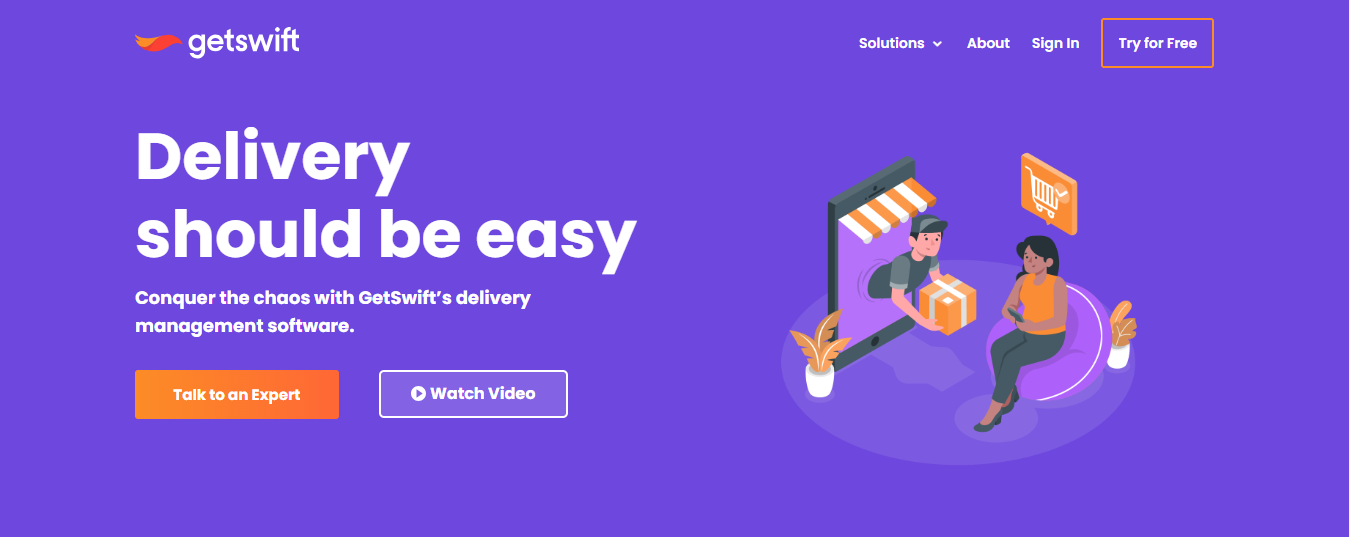
GetSwift is a delivery management software designed to streamline logistics and dispatching processes for small businesses. Its detailed overview encompasses features such as route optimization, real-time tracking, and automated communication.
GetSwift’s focus on route optimization contributes to cost savings and improved efficiency in small business delivery operations. The platform’s real-time tracking feature allows businesses and customers to monitor the delivery progress accurately. Additionally, GetSwift includes tools for automated communication, keeping customers informed about their delivery status throughout the process.
While GetSwift emphasizes route optimization, real-time tracking, and automated communication, small businesses should carefully evaluate their specific needs and ensure they align with their operational requirements and budget constraints.
Price: GetSwift’s pricing model is tailored to the business’s needs and order volume. Small businesses can request a quote to align the solution with their budget constraints.
Notable Features
- Route Optimization: GetSwift optimizes delivery routes, contributing to cost savings and improved efficiency.
- Real-Time Tracking: The platform provides real-time tracking, allowing businesses and customers to monitor the delivery progress accurately.
- Automated Communication: GetSwift includes tools for automated communication, keeping customers informed about their delivery status.
Summary
GetSwift’s focus on route optimization, real-time tracking, and automated communication makes it a valuable solution for small businesses seeking to enhance their delivery processes.
Watch Out For: Small businesses should carefully evaluate their specific needs and ensure that GetSwift aligns with their operational requirements and budget constraints.
Factors To Consider When Choosing Delivery Software For Small Business
1. Scalability
Scalability is a fundamental factor to consider when choosing delivery software for a small business. The selected solution should have the flexibility to grow with the business, accommodating increased order volumes and expanding delivery operations. This ensures that the software remains a valuable asset even as the business evolves.
2. Integration Capabilities
The ability of the delivery software to seamlessly integrate with other tools and platforms used by the business is a crucial consideration. Small businesses often rely on a variety of software, including e-commerce platforms, inventory management systems, and customer relationship management (CRM) software. Choosing a solution with robust integration capabilities ensures a cohesive and streamlined workflow.
3. User-Friendly Interface
The user-friendliness of the delivery software is a significant factor, especially for small businesses with diverse teams. An intuitive and easy-to-navigate interface contributes to faster adoption, reducing the learning curve for team members. A user-friendly design ensures that all stakeholders can leverage the full capabilities of the software without undue complications.
4. Cost Considerations
Evaluating the overall cost of implementing delivery software is a critical step in the selection process. While the initial subscription or licensing costs are important, it’s equally crucial to consider any additional costs related to customization, training, and ongoing support. A comprehensive understanding of the total cost of ownership ensures that the chosen software aligns with the budgetary constraints of the small business.
5. Customer Support
The level of customer support provided by the software vendor is a critical factor influencing the overall user experience. Robust customer support ensures that issues are addressed promptly, questions are answered, and users have access to resources that facilitate effective usage of the software. Reliable support minimizes disruptions to delivery operations and contributes to a positive user experience.
6. Specific Industry Focus
Consider whether the delivery software has a specific industry focus that aligns with the small business. Some solutions may cater more effectively to certain industries, such as e-commerce, while others offer more general-purpose functionality. Aligning the software with the specific industry focus of the small business ensures that it meets the unique requirements and nuances of that industry.
7. Trial Period
Checking if the delivery software provider offers a trial period or a demonstration is a prudent step. This allows the small business to explore the features and functionality firsthand, ensuring that the chosen solution meets its specific requirements. A trial period provides an opportunity to assess the software’s compatibility with the business’s operations before making a commitment.
Conclusion
In the competitive landscape of small business operations, the right delivery software can be a game-changer. The top five successful delivery software solutions—Onfleet, Bringg, ShipBob, Tookan, and GetSwift—offer unique features tailored for small-scale operations. By understanding the benefits, nuances, and potential considerations associated with each software, small businesses can make informed decisions that align with their specific delivery needs. As the industry continues to evolve, leveraging the power of innovative delivery software becomes paramount in ensuring seamless and efficient delivery operations, contributing to the overall success of small businesses.




